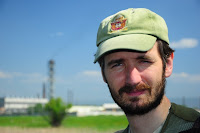
On Saturday June 12 a small group of ecological activists and journalists, led by ecologist and ornithologist Vova (right), got the chance to see the hard end of Russian and Soviet environmental attitudes during a tour of the Industrial Zone of Angarsk.
Getting off the elektrichka (suburban train) an hour outside of Irkutsk, a picture-postcard village of wooden houses and allotments was surrounded by long lines of tankers and wagons loaded with timber, chimney stacks silhouetted against the bright summer sky and palls of black smoke rising into the bright blue sky.
Walking out of the village and past squat Soviet blocks, we made our way to the landfill on the edge of town. Although officially not used for several years, several loads of new rubbish and fresh tyre tracks hinted otherwise.
Years of dumping meant the rubbish was several meters deep. Repeated fires had left everything that wouldn't burn covered in a layer of ash, leaving a landscape littered with bottles. Vova explained that although fires might go out on the surface, underneath the rubbish they can smoulder for months before reigniting, sending more smoke and toxins into the atmosphere.
Picking our way over the sometimes lunar landscape it was possible to look back over a small lake at the village we started our journey in, see birds wheeling in the air and people basking in the sun with fishing rods, and almost forget that you were standing on a rubbish dump.
After crossing the landfill, we made our way past gas-towers to the riverbank of the Angara for a lunch of bread, salad and meats. Crossing fields, the lush greenery of the Siberian summer continued to be juxtaposed with heavy industry on the horizon and more evidence of dumping on the side of the road.
Collapsed concrete buildings looked over mounds of waste, which included a bizzare mass of film spools, hardened in the sun. A few cars, and several small vans went past, with most drivers raising eyebrows at a group of hikers in such a place.
Pipes raised on concrete stilts began to flank the roads, getting denser as we approached silver and sparkling refinery buildings. Angarsk has long been a site of heavy industry and refining oil products. The first refinery was established here in the 1950's, and is one of the largest refineries in Russia.
Following the collapse of the Soviet Union, ownership of the refinery has mirrored the changing relationship between politics and business. At one time owned by Mikhail Khordokovsky's Yukos, (now most famous now for being on the wrong end of Kremlin goodwill), it was later aquired by Rosneft whose chairman is a close ally of current Prime Minister Vladimir Putin.
In contrast to the gleaming refinery buildings, shells of former factories stood empty and decaying, their walls greening with moss and windows a checkerboard of cracked and smashed panes.
Soon we were walking along the main roadway. A mass of raised pipes gleamed in the sunlight, affording some respite from the harsh sun. The smell of gas filled the air. Apart from empty minibuses and the occasional taxi, the well maintained road was empty save for our group. The only people who took and interest in us were the local police, who advised us to stop taking photos of 'strategically important' objects.
We continued on in the shade of the huge pipelines that ran alongside the road. Like a James Bond film everything was on a vast scale, the only colour being the green grass and the yellow signs warning pedestrians to not go any further. The quiet was broken only by occasional conversation and hissing from the pipes.
After what seemed like an age, we came to a tramstop. The babushki (grandmothers) waiting were pleasantly surprised to see a large group with some foreigners in tow. After using the opportunity to remember some English over the noise of nearby building work, they recounted how their used to be plenty of work in the area 'but now, it's all off limits and nothing happens anyway!'
Making our way back to the station and getting the elektrichka back, most of the group napped in the train, while others reflected on their experiences.
What did I think about it? Although I was pleased to have seen such unusual sights, it is not necessary to travel to Angarsk to appreciate the problems and contemplate solutions.
A trip into the English countryside without seeing evidence of fly-tipping is rare. A boat trip up the Thames estuary shows acres of landfill covered by seagulls, the combined result of mass consumption, packaging, but changing these requires huge shifts in popular attitudes and political will.
This is even more exacerbated for the refinery. The products from the refinery are exported to 14 countries. Products and fuels from Angarsk could be heating and moving England as you read this.






























